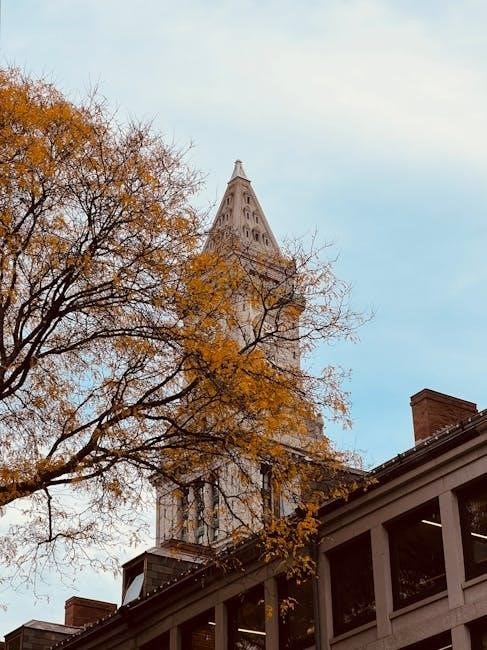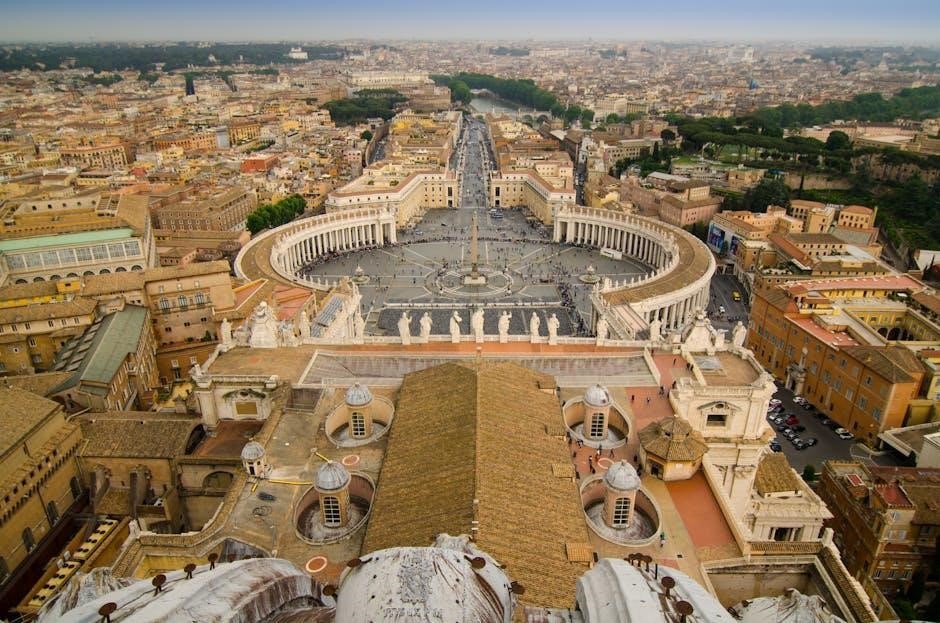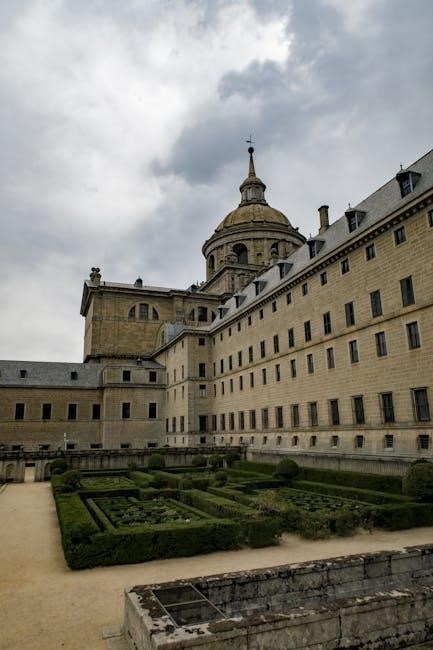Historical Background of the Sabbath
The Sabbath originates from biblical accounts in Genesis, where God rested on the seventh day, establishing it as a day of rest and worship․ Sanctified in the Ten Commandments, it became central to Jewish observance, reflecting divine commandment․
1․1 Origins of the Sabbath in the Bible
The Sabbath’s origins are rooted in the biblical account of creation, where God rested on the seventh day, sanctifying it as a day of rest (Genesis 2:2-3)․ It was later codified in the Ten Commandments, emphasizing its divine mandate for Israel (Exodus 20:8-11); Early Christian communities, while initially observing the seventh-day Sabbath, gradually transitioned to Sunday, aligning with the resurrection of Christ․ This shift reflected evolving theological understandings and practices within the early Church․
1․2 The Sabbath in Early Christianity
Early Christianity initially observed the seventh-day Sabbath, continuing Jewish traditions․ However, the resurrection of Christ on Sunday led to a gradual shift in worship practices․ By the 2nd century, Sunday became known as the Lord’s Day, symbolizing the resurrection․ The Catholic Church later formalized this change, emphasizing Sunday as a day of worship and rest, while the seventh-day Sabbath was minimized․ This transition reflected evolving theological perspectives and the Church’s growing influence over Christian practices․

The Role of the Catholic Church in Changing the Sabbath
The Catholic Church, utilizing its religious authority, shifted the Sabbath from Saturday to Sunday, supported by historical evidence from councils and documents, establishing Sunday as the Lord’s Day in Christian worship․
2․1 The Catholic Church’s Authority in Religious Tradition
The Catholic Church’s authority in religious tradition is rooted in its apostolic succession and the belief in the Magisterium․ Historically, the Church has asserted its power to interpret scripture and establish practices, including the Sabbath․ The Council of Laodicea, for instance, reflectsthe Church’s ability to alter traditions, such as the shift from Saturday to Sunday․ This authority is seen as divinely sanctioned, enabling the Church to make decisions that shape Christian worship and practice, emphasizing its role as a divine institution․
2․2 The Shift from Saturday to Sunday: Historical Evidence
The shift from Saturday to Sunday as the day of worship is supported by historical records, particularly the Council of Laodicea (c․ 363 AD), where canon 29 explicitly prohibited Sabbath observance․ Early Church Fathers like Justin Martyr and Eusebius noted the transition, attributing it to the resurrection of Christ․ This change was gradual, with Sunday gaining prominence as the “Lord’s Day․” The Catholic Church’s authority in religious tradition solidified this shift, aligning worship practices with its interpretative power over scripture and tradition․
Biblical and Theological Context
The Sabbath is rooted in Genesis, where God rested on the seventh day, and Exodus, where it was codified as a commandment․ In the New Testament, Jesus emphasized the Sabbath’s purpose, and early Christians observed Sunday as the Lord’s Day, symbolizing resurrection․ This theological shift from Saturday to Sunday reflects a transition from the Old Covenant to the New, emphasizing grace and redemption over ritual observance․
3․1 The Seventh-Day Sabbath in the Old Testament
The seventh-day Sabbath, rooted in Genesis, was sanctified by God as a day of rest․ In Exodus, it became the fourth commandment, a covenant sign for Israel․ Observance required ceasing work, reflecting trust in God’s provision․ The Sabbath symbolized creation’s completion and divine deliverance, central to Israelite identity and worship․ Its observance was rigorous, with desecration punishable by death, underscoring its sacredness in Old Testament tradition and law․
3․2 The First-Day Sabbath in the New Testament
The New Testament records the early Christian shift from the seventh-day Sabbath to the first day of the week, Sunday․ This change is linked to Christ’s resurrection, as described in John 20:1-10 and Acts 20:7, where believers gathered on the first day for worship and communion․ The apostles, particularly Paul, emphasized this transition, viewing Sunday as a symbol of renewal and the fulfillment of the Sabbath’s purpose․ This shift reflected the theological significance of Christ’s resurrection as the foundation of the new covenant․

Theological Implications of the Sabbath Change
The shift from Saturday to Sunday holds profound theological significance, reflecting the Catholic Church’s authority and its interpretation of Christ’s resurrection as the ultimate fulfillment of the Sabbath․
4․1 The Significance of the Sabbath in Worship
The Sabbath, rooted in biblical tradition, signifies a day of rest and worship, mirroring God’s rest after creation․ Its observance underscores divine commandment and spiritual renewal․ The Catholic Church’s shift to Sunday worship, aligning with Christ’s resurrection, emphasizes its theological importance․ This change highlights the Church’s authority in adapting religious practices, reinforcing Sunday as a day for communal celebration and Eucharistic observance, thus shaping Christian worship traditions while maintaining the Sabbath’s sacred essence․
4․2 The Shift from Saturday to Sunday: A Theological Perspective
The shift from Saturday to Sunday as the day of worship holds profound theological significance․ The Catholic Church attributes this change to the resurrection of Christ, which occurred on a Sunday, symbolizing the dawn of the New Covenant․ This transition reflects the Church’s authority in interpreting divine law and adapting traditions․ Sunday worship emphasizes the triumph of life over death and the fulfillment of the Sabbath’s purpose, marking a pivotal moment in Christian theology and practice, while respecting the Sabbath’s original intent․

The Council of Laodicea and the Sabbath
The Council of Laodicea, around 363 AD, formalized the shift from Saturday to Sunday as the day of worship, solidifying the Church’s authority in religious practice․
5․1 The Council’s Decision on the Sabbath
The Council of Laodicea, convened around 363 AD, explicitly addressed the Sabbath․ Canon 29 prohibited Christians from observing the Jewish Sabbath on Saturdays․ This decision marked a formal shift to Sunday as the day of worship, aligning with the resurrection of Christ․ The council’s ruling underscored the Catholic Church’s authority in establishing religious practices, effectively separating Christian observances from Jewish traditions․ This decree was pivotal in solidifying Sunday as the holy day for Christian worship․
5․2 The Impact of the Council on Christian Practices
The Council of Laodicea’s decision profoundly influenced Christian practices by distancing them from Jewish traditions․ It solidified Sunday as the primary day of worship, aligning it with Christ’s resurrection․ This shift promoted a distinct Christian identity and unified worship practices across the Church․ The council’s ruling reinforced the Catholic Church’s authority in shaping religious observances, ensuring Sunday’s prominence in liturgical life and fostering a broader separation from Jewish customs among early Christians․

Controversy and Debate Surrounding the Sabbath Change
The shift from Saturday to Sunday sparked debates about religious authority and tradition․ The Council of Laodicea’s decision remains a focal point of theological dispute and division․
6․1 Protestant Views on the Sabbath Change
Protestant perspectives on the Sabbath change vary widely, with many rejecting the Catholic Church’s authority in altering the day․ Some argue the shift was made by Christ or the apostles, while others emphasize biblical authority over tradition․ Protestant reformers often stressed the importance of Sunday as a day of worship, though not necessarily tied to Sabbath regulations․ However, debates persist among Protestants, with some groups, like Seventh-day Adventists, advocating for Saturday observance, highlighting ongoing theological divisions within Protestantism regarding the Sabbath’s proper day and significance․
6․2 Modern Debates and Reactions to the Sabbath Change
Modern debates surround the theological and cultural implications of the Sabbath change․ Some view it as a necessary adaptation to Christian worship, while others critique it as a deviation from biblical tradition․ Ecumenical discussions often address these differences, seeking common ground․ Meanwhile, contemporary society’s emphasis on work and leisure challenges traditional Sabbath observance․ The Catholic Church’s role in the change remains a focal point of discussion, with some groups advocating for a return to Saturday observance, reflecting ongoing theological and cultural tensions․
Official Church Documents and Statements
The Catholic Church acknowledges altering the Sabbath through historical councils like Laodicea, with Canon 29 formalizing Sunday observance․ Church authority rests on tradition and scripture, though the Bible lacks direct endorsement of this change․
7․1 The Catholic Church’s Official Admission
The Catholic Church officially acknowledges altering the Sabbath through historical councils, notably the Council of Laodicea, where Canon 29 prohibited Sabbath observance․ This shift from Saturday to Sunday was formalized, emphasizing Sunday as the Lord’s Day․ The Church’s authority, rooted in tradition and apostolic succession, supersedes biblical commandments, as the Bible lacks explicit endorsement of this change․ This admission underscores the Church’s role in shaping Christian practices, distinguishing it from seventh-day observances․
7․2 Key Quotes and References from Church Documents
Official Catholic documents affirm the Church’s role in changing the Sabbath․ The Catechism of the Catholic Church states, “The Sabbath, which represented the completion of the first creation, has been replaced by Sunday, the day of the new creation․” Historical records, such as the Council of Laodicea (Canon 29), explicitly prohibited Sabbath observance․ A Catholic source admits, “The Church has changed the Sabbath to Sunday by her own authority, and this change has been upheld by tradition and apostolic succession․”
The Sabbath Change in Modern Times
In modern Catholic worship, Sunday remains the central day of worship, reflecting the Church’s tradition of observing the Lord’s Day․ Contemporary practices emphasize Sunday Mass as the highlight of the week, while Saturday evening Masses are also recognized․ This shift underscores the Catholic Church’s enduring authority in shaping liturgical practices, aligning with its historical role in establishing Sunday as the day of worship․
8․1 The Sabbath in Contemporary Catholic Worship
In contemporary Catholic worship, Sunday is celebrated as the Lord’s Day, marking the resurrection of Christ and replacing Saturday as the day of rest․ The Church emphasizes Sunday Mass as the pinnacle of weekly worship, with many parishes also offering Saturday evening Masses for convenience․ This practice reflects the Catholic Church’s historical shift from the seventh-day Sabbath to Sunday, a tradition upheld through centuries․ The Vatican continues to stress the importance of Sunday worship, linking it to community fellowship and liturgical observance․
8․2 The Sabbath in Interfaith Dialogue
The Sabbath remains a significant topic in interfaith dialogue, particularly between Catholics and other Christian denominations, such as Seventh-day Adventists, as well as Jewish communities․ Discussions often highlight the Catholic Church’s role in shifting the Sabbath from Saturday to Sunday, with debates centered on biblical authority and tradition․ While some groups emphasize the original seventh-day observance, Catholics uphold Sunday as a day of worship honoring Christ’s resurrection․ These dialogues foster mutual understanding but also reveal enduring theological differences․
The Sabbath’s shift from Saturday to Sunday, admitted by the Catholic Church, highlights its enduring influence on Christian worship and theological traditions across centuries․
9․1 The Legacy of the Sabbath Change
The Catholic Church’s admission of altering the Sabbath from Saturday to Sunday reflects a profound shift in Christian tradition, rooted in apostolic authority and early Church practices․ This change, formalized through councils like Laodicea, distanced Christian worship from Jewish customs, emphasizing Sunday as a day celebrating Christ’s resurrection․ The legacy endures as a defining aspect of Catholic and Protestant worship, sparking theological debates yet underscoring the Church’s influential role in shaping Christian observances worldwide․
9․2 The Ongoing Relevance of the Sabbath in Christianity
The Sabbath remains a cornerstone of Christian worship, symbolizing rest, renewal, and devotion․ Its observance, now primarily on Sunday, underscores the resurrection of Christ and the fulfillment of divine covenant․ Despite debates over its origins, the Sabbath continues to unify believers across denominations, reinforcing spiritual identity and communal faith․ Its enduring relevance lies in its timeless theological significance, bridging past traditions with modern spiritual practices, ensuring its place in the heart of Christian observance and reflection․



